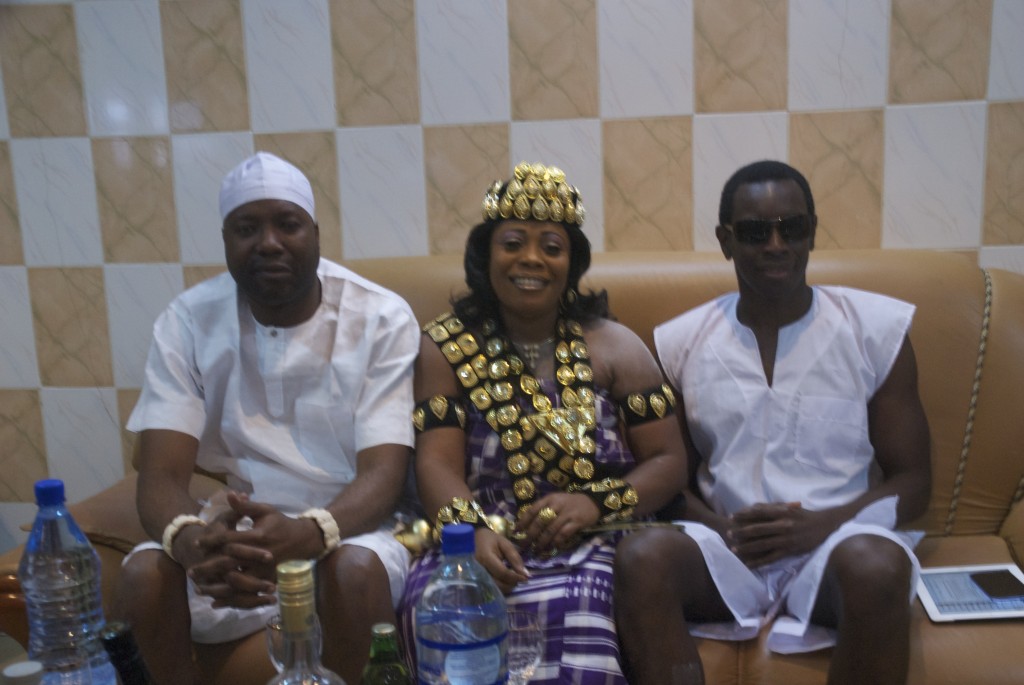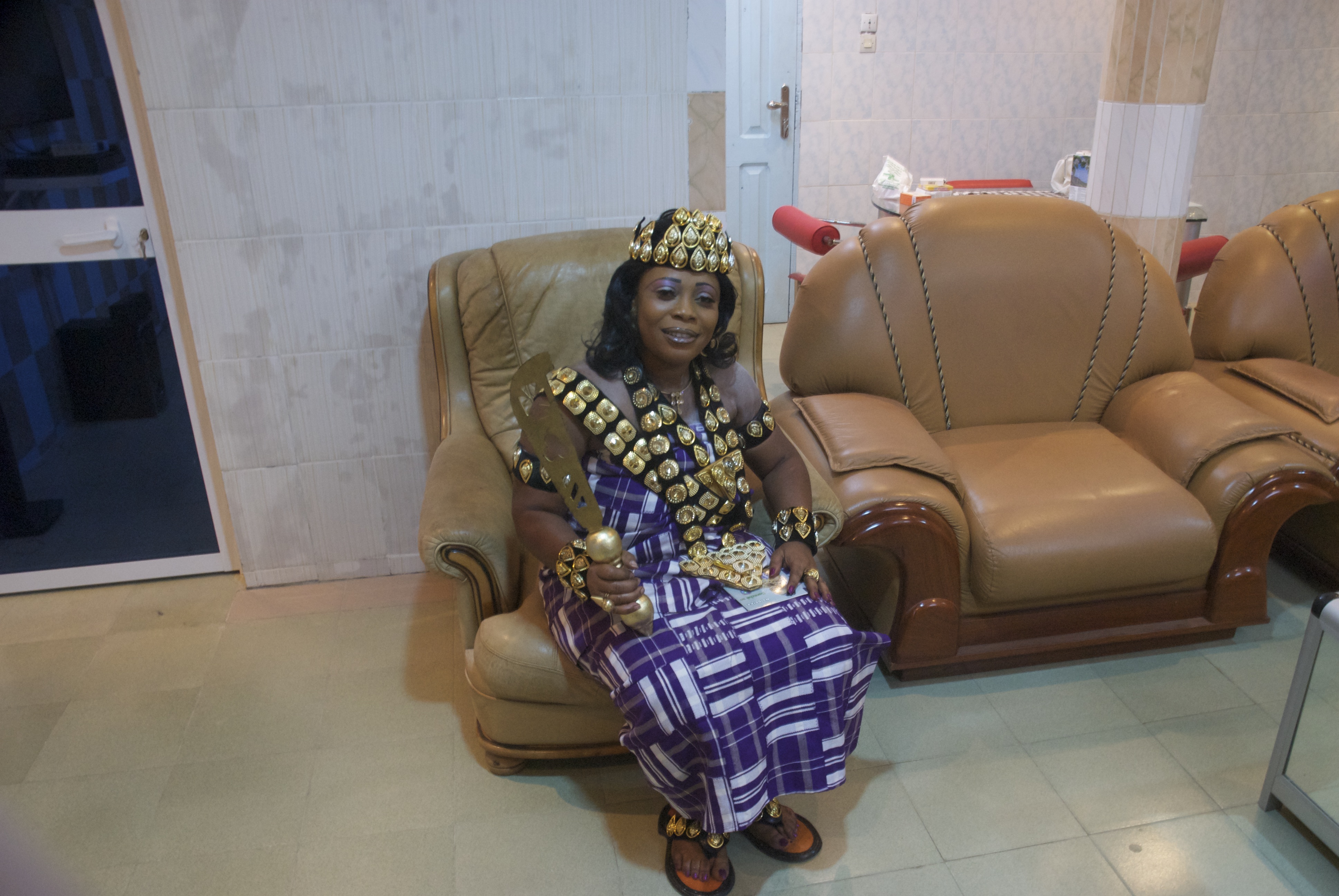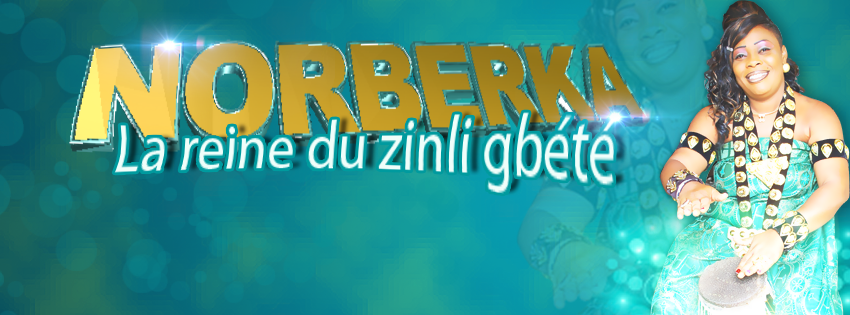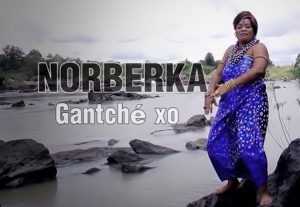While traveling in Benin preparing the program "Benin Roots Alive," producer Morgan Greenstreet met with Norberka, a renowned roots music artist at the home of Hounon Behumbeza, a major vodun priest and patron of the arts. Thank you to Dana Rush (author of Vodun in Coastal Benin) for introducing us to Norberka and Hounon Behumbeza.
Norberka: My name is Kpanou Agbla Norberte, alias Norberka. I’m a singer of Beninois traditional music. I also dance and sometimes I play percussion.
Morgan Greenstreet: And your specialty is zinli gbété.
Yes.
How is zinli gbété different from other styles of zinli?
Well, zinli gbété is a hidden rhythm, it’s a rhythm that was played for funerals. When there is a death in our region, in the Mono region, if an important person dies, or someone who has already had a child, or a someone who is a wise person, when they die, we have to play zinli gbété, it’s necessary to play zinli gbété before they are buried.
It’s a rhythm that is played for funerals. It isn’t played to make people dance, but we hope that we can make all of Benin dance with zinli gbété. We can give advice through zinli gbété, we can give many things, people can take many things from it. That’s why I chose to perform zinli gbété.
It’s a rhythm from my parents, from my grandparents. I was born into it and I’m proud to be a star of zinli gbété, of traditional music. It’s a rhythm that pleases everyone. Even if you are sick, when you hear the way we play zinli gbété, you can’t help but nod your head.
It’s true, I’ve listened to it and I find it beautiful.
Thank you.
Is it related to the zinli from Abomey, or is it different?
Yes and no. Zinli from Abomey is played a bit differently from our zinli. Actually, there are five different forms of zinli in Benin: zinli from Abomey, cotafon zinli, adja zinli, zinli from Ouémé, and the zinli gbété that I do. So there are five types of zinli. They’re all played in a different manner. For example, in our region, we play with five drums. In Abomey, they play with only three or four drums, so it’s a little bit different. But it’s the same thing, we all just play it our own way.
I see, I see. Do you also use other rhythms on your album?
Yes, for example zandro. Zandro is another hidden rhythm which our grandparents, the vodun priests, the hounons, have not yet given us the OK to bring out yet, because it is played for the adepts of the vodun shrines. It’s called azelehoun, for the adepts of Hevioso, the adepts of Egu, etc. They’re the ones who practice that. So, it’s still a hidden rhythm; it’s still a rhythm that our grandparents, the vodun priests, the hounons, have not yet given us the OK to popularize yet.
For me, I’ve seen that I love zandro as well as zinli and also agbadja. Agbadja is a rhythm that makes people dance as well. The great Kpatsavi brought that out, and over time, they started improving it, improving it until agbadja is enthroned today in Benin. But agbadja is also played in Ghana. I like to make a mix of rhythms, because not only people in Benin, but all of Africa, all of the world will buy our CD. And everyone needs to find themselves in it, everyone needs to find their identity through our CDs.
It’s important that everyone finds themselves in what I do. Even if someone tells me “I don’t understand zinli,” maybe when they hear agbadja, they’ll dance and they’ll say “That’s where I’m coming from!” Or, when someone hears azelehoun, zandro, they’ll say, “That’s where I’m coming from!” Everyone needs to find themselves in what I do.
And your lyrics, are they original or are they the lyrics of the vodun shrine songs? How does that work?
No, the lyrics are not from the shrine. I compose all the songs, they are not the shrine songs, because we can’t just take songs from the shrine just for singing. We need to give advice through this music. Putting the shrine to one side, there’s the public side, the general public is there and they want to hear something through what you do.
I compose the songs, I give a lot of advice, I talk a lot. I write my own lyrics, I don’t take the songs from the shrine.
Ah, OK, I see. So, what are some of the themes you sing about? For example, the fourth song on your album, which uses the azelehoun rhythm, “Gbé Dokpo”— what is that about?
“Gbé Dokpo” means “A day for me.” I’m waiting for something. I prayed, I asked for something from my god. I asked for something specific in the name of my ancestors, and I know that one day, I will have what I asked for. For example, I want to travel. I said, “Ancestors, in 2015, I want to travel to the United States.”
I hope that will happen!
That’s it. That’s what I have in mind. I have to say it, I have to be sure of what I say. “A day for me,” that’s what I asked for from my god, in the name of my ancestors, I’m waiting on you. I’m waiting to receive what I asked for, one day. One day for me.
Very good.
In another song, I said “Gantché xo, My time has come." You see, in life, everyone says, “Ah, now I need to do this thing, I want to do that other thing.” But as soon as you have that thing, you have to quickly say, “Ah, what I asked for has come to pass, which means my time has come. Because I have what I asked for in my hand. My time has come. The time of happiness, the time of glory, the time of health has come. Because I asked from something, in the name of my ancestors and they gave it to me. That’s why I say, “Gantché xo, my time has come.”
Nice, thank you. I understand.
Then there’s “Vignon,” ‘A child is a good thing.” In life, it’s good to give birth to a child. For example, when you are sick, when you need something, you don’t go get it yourself, your child will. You will say, “My child, go to such and such a place.” For example, if my father is sick, who will take care of him? Me, his child! I am his child, he gave me life so that tomorrow I can bring him a bit of support.
I understand.
Good. Then there’s “Dovoh,” the housewife who doesn’t do anything with her time. She just goes from door to door, gossiping. You don’t do anything, you’re not a merchant, you don’t have a career or a job, you just do nothing, you’re at the house. And your husband alone takes care of you. But one day, your husband will be tired, and when your husband doesn’t give you any more money, you will have nothing to even buy bread with. One day, if your husband doesn’t kick you out, your husband’s family will make you leave the house. They will say, “Enough is enough!” Because you do nothing, nothing but look for trouble for your husband, for your family, for your eldest born. So I sang about that.
I gave advice to the woman who stays home and does nothing, I advised her to do something; the woman should not be at home, doing nothing. The woman should work a bit, the husband too, and together they will build a good home.
Thank you, I understand. I wanted to ask how it is to be a female performer in Benin? There are not many women doing traditional-popular music.
True.
So, how did you end up in this position?
You see, traditional music is very difficult. It is very, very difficult because it takes a lot of work. It is like making a drawing: you should see the head of the man, see the middle and see the feet. If it isn’t like that, people can’t appreciate the meaning of what you do. So traditional music is very difficult, because you have to compose the song from the top to the bottom. It’s difficult for people who make modern pop music to enter deeply into traditional music. I’m not trying to say anything against people who make modern pop music, not at all. It’s just that modern pop music is very different from traditional music. In modern music, you sing two words and you complete the song with the music, but traditional music is not like that. You have to do all the work, for a traditional song, you have to have the head, the middle and the bottom. That’s why many people—especially women—can’t do it.
But it’s very easy for me. I compose songs just like that, they come to me like that. Then I take the top of the song, I say, "Here’s the top, here’s the middle and here’s the bottom." And when you work on songs like that, you’re set.
If you give yourself over to traditional music, it takes up all your time! Because traditional music is very jealous! You can’t go to the market, you can’t go to your shop, you can’t do anything, because when a song comes to you like that, you have to finish it.
Sometimes I wake up a two in the morning, my husband and I are in bed, and I say, "No, there’s something moving in me, I can’t sleep, it will wake me up." When it comes like that, it will wake me up, and if I don’t get up and work on it, I can’t sleep.
So, it’s very difficult to make traditional music, it’s not easy like modern music. I know, because I’ve made modern music, too. I compared traditional music and modern music and I saw that traditional music is more difficult. In modern music, you sing two words and you complete it with the music, you sing blah, blah, blah and everyone dances.
But you chose to do traditional music. Why?
I chose to do traditional music because I saw that our rhythms were becoming hidden. Not only zinli gbété, there are still many rhythms that are hidden, because the work of traditional music is very difficult. When you want to make traditional music, you need to prepare yourself. You need to tell yourself, “I want this thing.” You need to stick with it, you need to follow its steps, you need follow its laws, because it will give you laws. "Are you ready to follow us? You can’t do this, you can’t do that." No person will tell you these things, but when you start with traditional music, it will quickly tell you "I don’t like that. If you want to make traditional music, I do not like that behavior. You can’t do that with me." Because traditional music is very jealous, so it’s very difficult to do.
But for me, it’s pretty easy; I was born with this. I’ve seen that when you make traditional music, you can also be at ease! Because you need to speak to people, and when they listen to you, they will say, "Yes! She really said something!" You need to touch people through your songs.
I often hit the mark. I have a song that is about a woman who has not given birth to children, and the consequences of that situation. When women who haven’t had children yet hear that song, they will cry. Even if you have a child, you will cry! I remember, when I composed that song, I cried for three days as the song passed through me. I wrote it in one sitting and it rocked me, it went right through me. How could I ever forget that?
So, traditional music is very difficult, but if you give yourself to it, it will open its doors to you. You just need to plunge in all the way and it will reveal itself to you, just like that. Sometimes you’re in the kitchen, you’re in the shower, and then a song just comes to you like that.
And you also play the drums, the percussion, right? Is it rare for a woman to play percussion in Benin?
Yes. [Laughs] It’s especially rare for zinli gbété, because women do not play that drum. When a man gets on that drum for at least 45 minutes or an hour—excuse me—when he needs to piss, there’s nothing but blood.
If I’m lying, you can ask his majesty, because he’s known as Azahoun, he’s a drummer. When you get on that, you play for one hour, an hour and a half and when you need to urinate, there’s nothing but blood. So it’s difficult for a woman to get on the drum for 45 minutes or an hour. But I do it, because I’ve devoted myself to this. His majesty Hounon Behumbeza, he’s someone who plays this drum, and he said to me, “No, my child, go ahead.” And when I get on the drum, I’m at ease; when I want to play, I’m at ease. I play almost all the instruments, the bells, the shakers and the drums.
And how is this received by the general public, by your audiences?
Ah…I remember well the day of my album release concert, because it was a surprise, I didn’t even tell his majesty Hounon Behumbeza that I wanted to play. I got on stage, I did one or two songs and then I got on the drum. Everybody stood up! Because they’d never seen [a woman do] that before.
A woman can take a stick and play a drum with that, but playing with the hands, playing zinli gbété, it’s very difficult. First off, if you’re not used to doing it, you can’t do it. But I play at the end of each of our rehearsals. We are at least 35: There’s a group of 12, a group of 18 and a group of eight and seven. We travel with the group of eight; when this group plays, I’m obliged to play a drum. So, each rehearsal, when we finish the big group rehearsal, I sometimes play the shakers, sometimes I play the drums. There are five drums: the kpessi, the tonton, the tevi and the vlevi, which is called madjegbo, and there’s the big drum, which is called adja. Sometimes I play tevi, sometimes I play the big drum which goes in the middle. I like to mix it up a bit, to make some small changes like that.
I think that’s great. I don’t know if this is true in Benin, but I know that elsewhere in Africa and the African diaspora there are prohibitions against women playing drums. For example, in Cuba, women are forbidden from playing the sacred bata drums. This is a problem there, because many women want to play those drums, so there’s a tension.
We are lucky here, because there are people, for example his majesty Hounon Behumbeza, who are born in this, who give us the OK to do this. Because if you don’t have someone, a wise man who supports you, who gives you the permission to do this, you can’t do it. These wise men saw that if a woman gets on the adja drum, it’s a pleasure for them, it’s an honor for them, that at least their female children can play the adja drum. It is a great pleasure. Here there are certain drums that, as a woman, you cannot play! You cannot! For example the houngá, as a woman, you cannot play that drum. But we are in the process of asking for the OK to do it. Our big brothers have not had the good fortune to do it, but we could do it, but without their permission, we can’t do it. They need to give us the OK, the authorization to do it.
[caption id="attachment_22517" align="aligncenter" width="640"] Hounon Behumbeza, Norbeka, and a recent initiate[/caption]
Hounon Behumbeza, Norbeka, and a recent initiate[/caption]
How is your music tied to vodun religion and to his majesty Hounon Behumbeza?
Ah, OK. In fact, it’s his rhythm. Zinli is played everywhere in Benin, but differently. The vodun adepts can dance and play our zinli, because it comes from the shrine. Zinli comes from the shrine, but the big men improved it a bit, they didn’t want it to be played in the same way as they play it for the shrine. That’s why they brought it out of the shrine. They said, "OK, there we play a bell, now we will add a bell." Meaning they improved it so that the people of the shrine wouldn’t say, "Ah! That’s the same way we play it in the shrine that you are playing it!"
All our traditional rhythms, they are all found in vodun, in the shrines. They are played in the shrines. Me, when I dress like this, people say, ‘She’s not an artist, she is a vodun adept.’ But I’m proud of that, because it’s my culture. You understand?
Yes.
It’s my culture. When we say vodun, when we say adept, when we say zinli. It’s the same thing. Even the songs that we play in church come from the shrine. We have to be clear with people.
Yes. I think it’s important to be proud of that, and in Benin, people have started to be proud of that.
Yes, I am proud, I am proud of myself. I don’t reproach myself for anything, my conscience is clean. Everything I do, there are people like his majesty, who tell me "Norberka, I support you." If it isn’t good, he’ll tell me. They will say, "No, what you’re doing is no good, you have to change that. You need to improve that." Sometimes when I compose a song, I call him and I work from morning until night and I tell him, ‘I have this composition, can you help me arrange it a bit?’ And he says, "Yes, this part, take that out, put that in the middle, take that out, look for something else for here and put that inside." He does this not because he’s an adept, not because he’s a hounon, but because he knows that what I do comes from where he comes, comes from the shrine, and he knows that it is his work to accompany me. Because if the tradition is lost, it is finished!
But I don’t want the tradition to be lost, that’s why I’m following these paths.
Excellent. Thank you. I’m happy that we got a chance to meet and talk.
Thank you, me too.
Is there anything else that you’d like to add?
I’d like to thank everybody who has followed me up to this point, who has advised me to keep it up. I say thank you to my mother, she is the one who nourished me. I say thank you to my mama and papa, who accepted my choice of career! Because it’s not easy, the beginning was very difficult. My parents didn’t believe in me at first, they didn’t have confidence in me. But at some point, they said, "Ah, what our child is doing, we have to support her." I thank them.
And big thanks goes to his majesty Hounon Behumbeza. I must really give him my sincere thanks. Not me alone, but I say thank you in the name of all the artists, because today, he is the father of all the artists. I say thank you to him, because it is not easy to give, always to give, each time to take out his own money, give his own money, to support his culture. I thank him, and I thank you as well, because you don’t want our culture to be lost without a trace. Thanks to Dana Rush, my godmother, you are a mother to me, thank you. If what I do today is not yet good, trust me, you can count on me, I will not deceive you, I will continue to work on it. Wherever you want me to go, I will always be there for you. Thanks so much.
Thank you!










